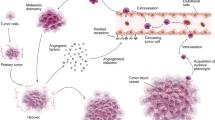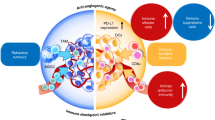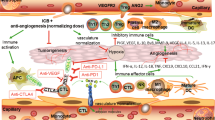Key Points
-
The addition of anti-angiogenic agents to cytotoxic chemotherapy prolongs patient survival in specific types of cancer.
-
Objective response is a poor estimate of probable benefit from the addition of anti- vascular-endothelial-growth-factor (VEGF) therapy in colorectal cancer.
-
The cost and choice of cancer therapy are increasing dramatically. Therefore, a high likelihood of benefit is needed to justify the use of a targeted anti-angiogenic agent.
-
Anti-angiogenic therapies induce a number of biological and physiological changes in preclinical models of cancer. Similar observations have been reported in human disease, and might function as early indicators of survival benefit.
-
Resistance to anti-VEGF therapy has been noted in human and animal models. Understanding the mechanisms of resistance will be essential when choosing second-line therapies.
-
The optimal biological dose of anti-angiogenic therapy is likely to be lower than the maximum tolerated dose used for cytotoxic chemotherapy. Biomarkers could be needed to guide adequate dose selection and maximize potential benefit.
-
A better understanding of the mechanism of anti-angiogenic therapy is essential to guide the development of biomarkers, drug choice and dosage, and improve survival.
Abstract
A high probability of benefit is desirable to justify the choice of anti-angiogenic therapy from an ever-expanding list of expensive new anticancer agents. However, biomarkers of response to cytotoxic agents are not optimal for predicting benefit from anti-angiogenic drugs. This discussion will focus on both preclinical and clinical research to identify biomarkers for anti-angiogenic therapies that can inform dosing, early clinical benefit, initial drug choice, emerging resistance and second-line treatments.
This is a preview of subscription content, access via your institution
Access options
Subscribe to this journal
Receive 12 print issues and online access
$209.00 per year
only $17.42 per issue
Buy this article
- Purchase on Springer Link
- Instant access to full article PDF
Prices may be subject to local taxes which are calculated during checkout





Similar content being viewed by others
References
Carmeliet, P. & Jain, R. K. Angiogenesis in cancer and other diseases. Nature 407, 249–57 (2000).
Ferrara, N. Vascular endothelial growth factor: basic science and clinical progress. Endocr. Rev. 25, 581–611 (2004).
Hurwitz, H. et al. Bevacizumab plus irinotecan, fluorouracil, and leucovorin for metastatic colorectal cancer. N. Engl. J. Med. 350, 2335–2342 (2004). The first phase III randomized controlled clinical trial to show a survival benefit from a targeted anti-angiogenic agent in human cancer.
Ferrara, N., Hillan, K. J., Gerber, H. P. & Novotny, W. Discovery and development of bevacizumab, an anti-VEGF antibody for treating cancer. Nature Rev. Drug Discov. 3, 391–400 (2004).
Ludwig, J. A. & Weinstein, J. N. Biomarkers in cancer staging, prognosis and treatment selection. Nature Rev. Cancer 5, 845–856 (2005).
Jain, R. K. Normalization of tumor vasculature: an emerging concept in antiangiogenic therapy. Science 307, 58–62 (2005).
Kabbinavar, F. et al. Phase II, randomized trial comparing bevacizumab plus fluorouracil (FU)/leucovorin (LV) with FU/LV alone in patients with metastatic colorectal cancer. J. Clin. Oncol. 21, 60–65 (2003).
Jayson, G. C. et al. Molecular imaging and biological evaluation of HuMV833 anti-VEGF antibody: implications for trial design of antiangiogenic antibodies. J. Natl Cancer Inst. 94, 1484–1493 (2002). A phase I clinical trial that addresses the potential problems with the pharmacokinetics of antibodies that are designed to target tumour vasculature.
Mass, R. D., Sarkar, S., Holden, S. N. & Hurwitz, H. Clinical benefit from bevacizumab (BV) in responding (R) and non-responding (NR) patients (pts) with metastatic colorectal cancer (mCRC). J. Clin. Oncol. 23, 249S–249S (2005).
Miller, K. D. et al. Randomized phase III trial of capecitabine compared with bevacizumab plus capecitabine in patients with previously treated metastatic breast cancer. J. Clin. Oncol. 23, 792–799 (2005).
Relf, M. et al. Expression of the angiogenic factors vascular endothelial cell growth factor, acidic and basic fibroblast growth factor, tumor growth factor β-1, platelet-derived endothelial cell growth factor, placenta growth factor, and pleiotrophin in human primary breast cancer and its relation to angiogenesis. Cancer Res. 57, 963–969 (1997).
Drevs, J. et al. Soluble markers for the assessment of biological activity with PTK787/ZK 222584 (PTK/ZK), a vascular endothelial growth factor receptor (VEGFR) tyrosine kinase inhibitor in patients with advanced colorectal cancer from two phase I trials. Ann. Oncol. 16, 558–565 (2005).
Huang, J. et al. Vascular remodeling marks tumors that recur during chronic suppression of angiogenesis. Mol. Cancer Res. 2, 36–42 (2004).
Schrag, D. The price tag on progress — chemotherapy for colorectal cancer. N. Engl. J. Med. 351, 317–319 (2004). A reminder that biomarkers that indicate a high likelihood of benefit are essential to justify both the choice and the expense of new targeted therapies.
Christofori, G., Naik, P. & Hanahan, D. Vascular endothelial growth factor and its receptors, flt-1 and flk-1, are expressed in normal pancreatic islets and throughout islet cell tumorigenesis. Mol. Endocrinol. 9, 1760–1770 (1995).
Inoue, M., Hager, J. H., Ferrara, N., Gerber, H. P. & Hanahan, D. VEGF-A has a critical, nonredundant role in angiogenic switching and pancreatic β cell carcinogenesis. Cancer Cell 1, 193–202 (2002).
Joyce, J. A. et al. Stage-specific vascular markers revealed by phage display in a mouse model of pancreatic islet tumorigenesis. Cancer Cell 4, 393–403 (2003).
Bergers, G., Javaherian, K., Lo, K. M., Folkman, J. & Hanahan, D. Effects of angiogenesis inhibitors on multistage carcinogenesis in mice. Science 284, 808–812 (1999). A preclinical paper that identifies the need for stage-specific inhibitors of angiogenesis.
Bergers, G. et al. Matrix metalloproteinase-9 triggers the angiogenic switch during carcinogenesis. Nature Cell Biol. 2, 737–744 (2000).
Bergers, G., Song, S., Meyer-Morse, N., Bergsland, E. & Hanahan, D. Benefits of targeting both pericytes and endothelial cells in the tumor vasculature with kinase inhibitors. J. Clin. Invest. 111, 1287–1295 (2003).
Slamon, D. J. et al. Use of chemotherapy plus a monoclonal antibody against HER2 for metastatic breast cancer that overexpresses HER2. N. Engl. J. Med. 344, 783–792 (2001).
Hillan, K. J. et al. The role of VEGF expression in response to bevacizumab plus capcitabine in metastatic breast cancer (MBC). J. Clin. Oncol. 21, 284S–284S (2003).
Jubb, A. M. et al. Impact of vascular endothelial growth factor-A expression, thrombospondin-2 expression, and microvessel density on the treatment effect of bevacizumab in metastatic colorectal cancer. J. Clin. Oncol. 24, 217–227 (2006).
Kuramochi, H. et al. Vascular endothelial growth factor messenger RNA expression level is preserved in liver metastases compared with corresponding primary colorectal cancer. Clin. Cancer Res. 12, 29–33 (2006).
Wedam, S. B. et al. Antiangiogenic and antitumor effects of bevacizumab in patients with inflammatory and locally advanced breast cancer. J. Clin. Oncol. 24, 769–777 (2006).
Willett, C. G., et al. Direct evidence that the VEGF-specific antibody bevacizumab has antivascular effects in human rectal cancer. Nature Med 10, 145–147 (2004). A seminal paper from the first group to undertake a comprehensive analysis of putative biomarkers of bevacizumab activity in rectal cancer.
Willett, C. G. et al. Surrogate markers for antiangiogenic therapy and dose-limiting toxicities for bevacizumab with radiation and chemotherapy: continued experience of a phase I trial in rectal cancer patients. J. Clin. Oncol. 23, 8136–8139 (2005).
Eberhard, A. et al. Heterogeneity of angiogenesis and blood vessel maturation in human tumors: implications for antiangiogenic tumor therapies. Cancer Res. 60, 1388–1393 (2000).
Inai, T. et al. Inhibition of vascular endothelial growth factor (VEGF) signaling in cancer causes loss of endothelial fenestrations, regression of tumor vessels, and appearance of basement membrane ghosts. Am. J. Pathol. 165, 35–52 (2004).
Strickland, L. A. et al. Plasmalemmal vesicle-associated protein (PLVAP) is expressed by tumour endothelium and is upregulated by vascular endothelial growth factor-A (VEGF). J. Pathol. 206, 466–475 (2005).
Hardwick, J. S. et al. Identification of biomarkers for tumor endothelial cell proliferation through gene expression profiling. Mol. Cancer Ther. 4, 413–425 (2005).
Erber, R. et al. Combined inhibition of VEGF and PDGF signaling enforces tumor vessel regression by interfering with pericyte-mediated endothelial cell survival mechanisms. FASEB J. 18, 338–340 (2004).
Yu, J. L., Rak, J. W., Coomber, B. L., Hicklin, D. J. & Kerbel, R. S. Effect of p53 status on tumor response to antiangiogenic therapy. Science 295, 1526–1528 (2002).
Rak, J. et al. Mutant ras oncogenes upregulate VEGF/VPF expression: implications for induction and inhibition of tumor angiogenesis. Cancer Res. 55, 4575–4580 (1995).
Rak, J. et al. Oncogenes and tumor angiogenesis: differential modes of vascular endothelial growth factor up-regulation in ras-transformed epithelial cells and fibroblasts. Cancer Res. 60, 490–498 (2000).
Ince, W. L., et al. Association of k-ras, b-raf, and p53 status with the treatment effect of bevacizumab. J. Natl Cancer Inst. 97, 981–989 (2005).
Holden, S. N., Ryan, E., Kearns, A., Holmgren, E. & Hurwitz, H. Benefit from bevacizumab (BV) is independent of pretreatment plasma vascular endothelial growth factor-A (pl-VEGF) in patients (pts) with metastatic colorectal cancer (mCRC). J. Clin. Oncol. 23, 259S–259S (2005).
Hobson, B. & Denekamp, J. Endothelial proliferation in tumours and normal tissues: continuous labelling studies. Br. J. Cancer 49, 405–413 (1984).
Casanovas, O., Hicklin, D. J., Bergers, G. & Hanahan, D. Drug resistance by evasion of antiangiogenic targeting of VEGF signaling in late-stage pancreatic islet tumors. Cancer Cell 8, 299–309 (2005).
Viloria-Petit, A. et al. Acquired resistance to the antitumor effect of epidermal growth factor receptor-blocking antibodies in vivo: a role for altered tumor angiogenesis. Cancer Res. 61, 5090–5101 (2001).
Sini, P. et al. The antitumor and antiangiogenic activity of vascular endothelial growth factor receptor inhibition is potentiated by ErbB1 blockade. Clin. Cancer Res. 11, 4521–4532 (2005).
Kumar, H. et al. Preoperative serum vascular endothelial growth factor can predict stage in colorectal cancer. Clin. Cancer Res. 4, 1279–1285 (1998).
Rodriguez, C. R., Fei, D. T., Keyt, B. & Baly, D. L. A sensitive fluorometric enzyme-linked immunosorbent assay that measures vascular endothelial growth factor165 in human plasma. J. Immunol. Methods 219, 45–55 (1998).
Kindler, H. L. et al. Phase II trial of bevacizumab plus gemcitabine in patients with advanced pancreatic cancer. J. Clin. Oncol. 23, 8033–8040 (2005).
Faivre, S. et al. Safety, pharmacokinetic, and antitumor activity of SU11248, a novel oral multitarget tyrosine kinase inhibitor, in patients with cancer. J. Clin. Oncol. 24, 25–35 (2006).
Motzer, R. J. et al. Activity of SU11248, a multitargeted inhibitor of vascular endothelial growth factor receptor and platelet-derived growth factor receptor, in patients with metastatic renal cell carcinoma. J. Clin. Oncol. 24, 16–24 (2006).
Christensen, O. et al. Measurement of VEGF, sVEGFR-2, and DCE-MRI in a phase I study with BAY 58–9352, a VEGFR inhibitor. Eu. J. Clin. Pharmacol. 61, 704–704 (2005).
Bocci, G. et al. Increased plasma vascular endothelial growth factor (VEGF) as a surrogate marker for optimal therapeutic dosing of VEGF receptor-2 monoclonal antibodies. Cancer Res. 64, 6616–6625 (2004).
Lee, L. et al. Biomarkers for assessment of pharmacologic activity for a vascular endothelial growth factor (VEGF) receptor inhibitor, PTK787/ZK 222584 (PTK/ZK): translation of biological activity in a mouse melanoma metastasis model to phase I studies in patients with advanced colorectal cancer with liver metastases. Cancer Chemother. Pharmacol. 57, 761–771 (2006).
Levine, A. M. et al. Phase I Study of Antisense Oligonucleotide Against Vascular Endothelial Growth Factor: Decrease in Plasma Vascular Endothelial Growth Factor With Potential Clinical Efficacy. J. Clin. Oncol. 24, 1712–1719 (2006).
Autiero, M. et al. Role of PlGF in the intra- and intermolecular cross talk between the VEGF receptors Flt1 and Flk1. Nature Med. 9, 936–943 (2003).
Carmeliet, P. et al. Synergism between vascular endothelial growth factor and placental growth factor contributes to angiogenesis and plasma extravasation in pathological conditions. Nature Med. 7, 575–583 (2001).
Salmon, J. S. et al. MALDI-TOF mass spectrometry proteomic profiling to discriminate response to the combination of bevacizumab and erlotinib in non-small cell lung cancer (NSCLC). J. Clin. Oncol. 23, 626S–626S (2005).
Garcia-Barros, M. et al. Tumor response to radiotherapy regulated by endothelial cell apoptosis. Science 300, 1155–1159 (2003).
Hilbe, W. et al. CD133 positive endothelial progenitor cells contribute to the tumour vasculature in non-small cell lung cancer. J. Clin. Pathol. 57, 965–969 (2004).
Machein, M. R., Renninger, S., de Lima-Hahn, E. & Plate, K. H. Minor contribution of bone marrow-derived endothelial progenitors to the vascularization of murine gliomas. Brain. Pathol. 13, 582–597 (2003).
Peters, B. A. et al. Contribution of bone marrow-derived endothelial cells to human tumor vasculature. Nature Med. 11, 261–262 (2005).
Shaked, Y. et al. Genetic heterogeneity of the vasculogenic phenotype parallels angiogenesis; Implications for cellular surrogate marker analysis of antiangiogenesis. Cancer Cell 7, 101–111 (2005).
Mancuso, P. et al. Circulating endothelial cell kinetics and viability predict survival in breast cancer patients receiving metronomic chemotherapy. Blood 16 March 2006 [epub ahead of print].
Rugo, H. S. et al. Change in circulating endothelial cells (CEC) and tumor cells (CTC) in patients (pts) receiving bevacizumab and erlotinib for metastatic breast cancer (MBC) predicts stable disease at first evaluation. J. Clin. Oncol. 23, 10S–10S (2005).
Norden-Zfoni, A. et al. Levels of circulating endothelial cells (CECs) and monocytes as pharmacodynamic markers of SU11248 activity in patients (pts) with metastatic imatinib-resistant GIST. J. Clin. Oncol. 23, 825S–825S (2005).
Duda, D. G. et al. Differential CD146 expression on circulating versus tissue endothelial cells in rectal cancer patients: implications for circulating endothelial and progenitor cells as biomarkers for antiangiogenic therapy. J. Clin. Oncol. 24, 1449–1453 (2006).
Smirnov, D. A. et al. Global gene expression profiling of circulating endothelial cells in patients with metastatic carcinomas. Cancer Res. 66, 2918–2922 (2006).
Miller, J. C., Pien, H. H., Sahani, D., Sorensen, A. G. & Thrall, J. H. Imaging angiogenesis: applications and potential for drug development. J. Natl Cancer Inst. 97, 172–187 (2005).
Evelhoch, J. L. et al. Magnetic resonance imaging measurements of the response of murine and human tumors to the vascular-targeting agent ZD6126. Clin. Cancer Res. 10, 3650–3657 (2004).
Morgan, B. et al. Dynamic contrast-enhanced magnetic resonance imaging as a biomarker for the pharmacological response of PTK787/ZK 222584, an inhibitor of the vascular endothelial growth factor receptor tyrosine kinases, in patients with advanced colorectal cancer and liver metastases: results from two phase I studies. J. Clin. Oncol. 21, 3955–3964 (2003). A seminal paper on the clinical use of DCE-MRI as a biomarker for the efficacy of a targeted anti-angiogenic agent in human cancer.
Liu, G. et al. Dynamic contrast-enhanced magnetic resonance imaging as a pharmacodynamic measure of response after acute dosing of AG-013736, an oral angiogenesis inhibitor, in patients with advanced solid tumors: results from a phase I study. J. Clin. Oncol. 23, 5464–5473 (2005).
Kerbel, R. S. Therapeutic implications of intrinsic or induced angiogenic growth factor redundancy in tumors revealed. Cancer Cell 8, 269–271 (2005).
Acknowledgements
We thank all patients who participated in clinical trials of anti-angiogenic agents.
Author information
Authors and Affiliations
Corresponding author
Ethics declarations
Competing interests
Adrian Jubb is a visiting scientist at Genentech Inc. Scott Holden and Hartmut Koeppen are employees of Genentech Inc. and hold equity in the company.
Related links
Related links
DATABASES
National Cancer Institute
FURTHER INFORMATION
Bevacizumab (Avastin) resource center
Onyx pharmaceuticals sorafenib (Nexavar) web site
The National Cancer Institute understanding cancer series: angiogenesis
Glossary
- Intussusception
-
The taking up or receiving of one part within another. In reference to angiogenesis, intussusception is a specific term for the division of vessels by transluminal invagination and pillar formation.
- Cytostatic
-
The slowing or cessation of cellular replication in response to an intervention, such as a drug.
- RIP1-Tag2
-
A transgenic mouse strain that expresses the simian virus 40 large T antigen (Tag) under the rat insulin II promoter (RIP) in pancreatic islet cells. Carcinomas develop in the pancreatic islets and progress through characteristic stages.
- Pericytes
-
The fibroblastic and smooth muscle-like cells that are found in close contact with endothelium in small blood vessels. They function as regulators of blood vessel formation and function, contributing in particular to vascular integrity.
- Fenestrated endothelium
-
Endothelial fenestrations are anatomical apertures (with or without a structural diaphragm) that span the width of the cells that line the intimal surface of the cardiovascular and lymphatic systems.
- Metronomic scheduling
-
Chronic administration of chemotherapy at relatively low, non-toxic doses, on a frequent schedule of administration, with no prolonged drug-free breaks.
Rights and permissions
About this article
Cite this article
Jubb, A., Oates, A., Holden, S. et al. Predicting benefit from anti-angiogenic agents in malignancy. Nat Rev Cancer 6, 626–635 (2006). https://doi.org/10.1038/nrc1946
Published:
Issue Date:
DOI: https://doi.org/10.1038/nrc1946
This article is cited by
-
Anti-angiogenic therapy for advanced primary pulmonary lymphoepithelioma-like carcinoma: a retrospective multicenter study
Journal of Cancer Research and Clinical Oncology (2023)
-
Tumor immunotherapies by immune checkpoint inhibitors (ICIs); the pros and cons
Cell Communication and Signaling (2022)
-
Combination therapy with immune checkpoint inhibitors (ICIs); a new frontier
Cancer Cell International (2022)
-
A first-in-human Phase I dose-escalation trial of the novel therapeutic peptide, ALM201, demonstrates a favourable safety profile in unselected patients with ovarian cancer and other advanced solid tumours
British Journal of Cancer (2022)
-
Phase I/Ib study of crenolanib with ramucirumab and paclitaxel as second-line therapy for advanced esophagogastric adenocarcinoma
Cancer Chemotherapy and Pharmacology (2022)



